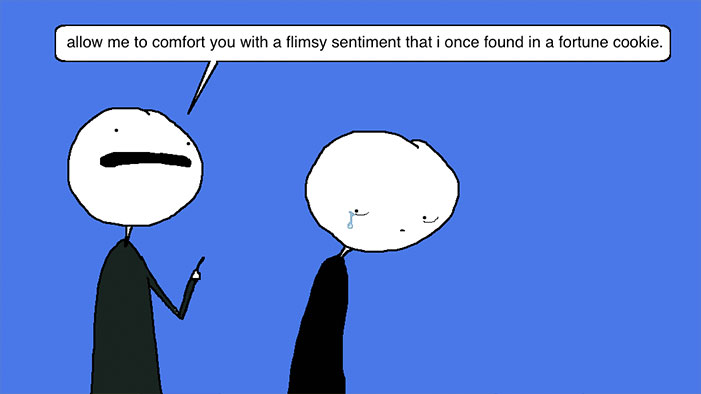Auntie SparkNotes: Things Not to Say to a Sad Person
 Dear Auntie,
Dear Auntie,
I’ve been to my fair share of funerals. Heck, after losing my dad, I was one of the main parties. As such, there are a lot of things people say that are not helpful. Examples include “It’s all part of His Plan,” and “He/she’s in a better place” or my favorite “You shouldn’t let it stop you. They’d want you to not stop.”
Grief is not a light thing. Sure, some people are not as heavily affected as others but all these sayings belittle loss and one’s emotional response. Can you tell your readers to either not say these unhelpful things or to just bring food? I think silence or a sincere “I’m sorry for your loss” is better these empty words.
I’m so sorry about your Dad, Sparkler.
And of course! Per your request, I can certainly take this moment to give due acknowledgement to both the problems with the platitudes you mentioned, and the superiority of a casserole to a cliche, especially if you stuff the casserole in your mouth at the exact moment that you feel compelled to say, “It was God’s plan!” to a grieving person. Unless you know the person you’re talking to appreciates that kind of thing, a simple (and secular) “I’m sorry” is the best and most inoffensive bet.
But with that said, I’m also duty-bound to gently push back against your assertion that comments like these are meant to belittle your grief, or to imply that you shouldn’t be feeling it. I know it may feel that way, but generally, it’s just not true. People say stuff like this for one very simple reason: because, more often than not, it’s the kind of thing they would find comforting (or think they would, anyway.) Some (usually devoutly religious) people do find genuine solace in the thought of a loved one serving a higher purpose or still existing in a heavenly realm — and some surviving parties find genuine strength in the knowledge that their loved one would want them to go on living.
And of course, some people don’t genuinely believe these things—or have never thought about it either way—but they feel bad, and they feel awkward, and they feel like they should say something… and in their desperation, they say something totally unhelpful. None of us ever get lessons in how to say the right thing to someone who’s just experienced a terrible loss. Perhaps we should.
None of which is to challenge your belief that silence or an “I’m sorry” is preferable to religious platitudes about death. That’s a totally valid perspective, and you have every right to it. It just bears mentioning that your personal feelings about these platitudes are not necessarily shared by everyone, and particularly not by the kind of people who break them out at funerals. You’re right: Grief is a huge, hard thing that everyone deals with differently. Unfortunately, that means that one person’s insipid, empty comment is another’s genuine expression of sympathy.
But because that’s the case, all the PSAs in the world won’t stop people from feeling uncomfortable about grief, from stumbling over their good intentions, and from occasionally putting their feet in their mouths at funerals. It’s just one of those things that humans do. And unless you can find the strength in that moment to say, “I know you mean well, but I don’t find that helpful,” the next best thing you can do is to find the generosity to try not to hold it against them… or at least to avoid hitting them in the face with a plateful of tuna noodle casserole.
Got something to say? Tell us in the comments! And to get advice from Auntie, email her at advice@sparknotes.com.
Want more info about how this column works? Check out the Auntie SparkNotes FAQ.












